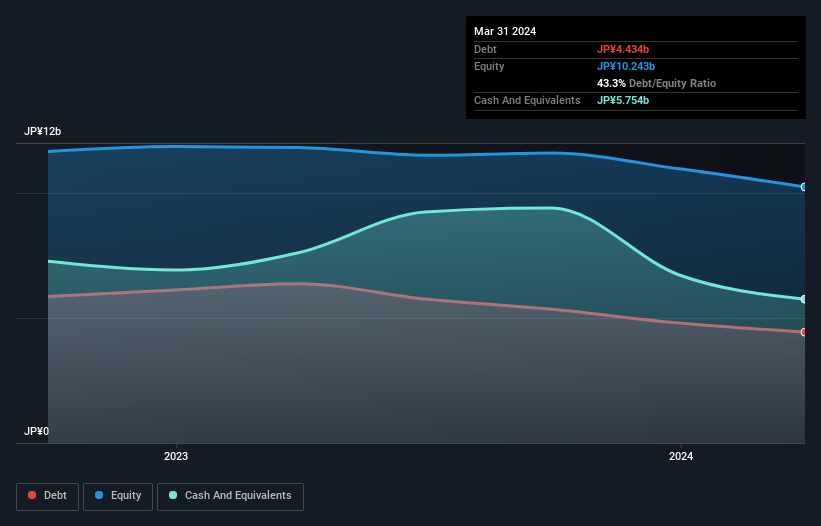
Legendary fund manager Li Lu (who Charlie Munger backed) once said, 'The biggest investment risk is not the volatility of prices, but whether you will suffer a permanent loss of capital.' So it seems the smart money knows that debt - which is usually involved in bankruptcies - is a very important factor, when you assess how risky a company is. We can see that Kufu Company Inc. (TSE:4376) does use debt in its business. But the more important question is: how much risk is that debt creating?
What Risk Does Debt Bring?
Debt and other liabilities become risky for a business when it cannot easily fulfill those obligations, either with free cash flow or by raising capital at an attractive price. Part and parcel of capitalism is the process of 'creative destruction' where failed businesses are mercilessly liquidated by their bankers. However, a more frequent (but still costly) occurrence is where a company must issue shares at bargain-basement prices, permanently diluting shareholders, just to shore up its balance sheet. Having said that, the most common situation is where a company manages its debt reasonably well - and to its own advantage. When we examine debt levels, we first consider both cash and debt levels, together.
See our latest analysis for Kufu
What Is Kufu's Net Debt?
You can click the graphic below for the historical numbers, but it shows that Kufu had JP¥4.43b of debt in March 2024, down from JP¥6.37b, one year before. But on the other hand it also has JP¥5.75b in cash, leading to a JP¥1.32b net cash position.

How Healthy Is Kufu's Balance Sheet?
According to the last reported balance sheet, Kufu had liabilities of JP¥5.80b due within 12 months, and liabilities of JP¥2.46b due beyond 12 months. On the other hand, it had cash of JP¥5.75b and JP¥2.47b worth of receivables due within a year. So these liquid assets roughly match the total liabilities.
This state of affairs indicates that Kufu's balance sheet looks quite solid, as its total liabilities are just about equal to its liquid assets. So while it's hard to imagine that the JP¥15.8b company is struggling for cash, we still think it's worth monitoring its balance sheet. Despite its noteworthy liabilities, Kufu boasts net cash, so it's fair to say it does not have a heavy debt load!
On the other hand, Kufu's EBIT dived 17%, over the last year. If that rate of decline in earnings continues, the company could find itself in a tight spot. There's no doubt that we learn most about debt from the balance sheet. But you can't view debt in total isolation; since Kufu will need earnings to service that debt. So when considering debt, it's definitely worth looking at the earnings trend. Click here for an interactive snapshot.
But our final consideration is also important, because a company cannot pay debt with paper profits; it needs cold hard cash. While Kufu has net cash on its balance sheet, it's still worth taking a look at its ability to convert earnings before interest and tax (EBIT) to free cash flow, to help us understand how quickly it is building (or eroding) that cash balance. Happily for any shareholders, Kufu actually produced more free cash flow than EBIT over the last two years. That sort of strong cash generation warms our hearts like a puppy in a bumblebee suit.
Summing Up
We could understand if investors are concerned about Kufu's liabilities, but we can be reassured by the fact it has has net cash of JP¥1.32b. The cherry on top was that in converted 143% of that EBIT to free cash flow, bringing in JP¥1.8b. So we are not troubled with Kufu's debt use. When analysing debt levels, the balance sheet is the obvious place to start. However, not all investment risk resides within the balance sheet - far from it. For example, we've discovered 4 warning signs for Kufu (1 is a bit concerning!) that you should be aware of before investing here.
At the end of the day, it's often better to focus on companies that are free from net debt. You can access our special list of such companies (all with a track record of profit growth). It's free.
Valuation is complex, but we're here to simplify it.
Discover if Kufu Company Holdings might be undervalued or overvalued with our detailed analysis, featuring fair value estimates, potential risks, dividends, insider trades, and its financial condition.
Access Free AnalysisHave feedback on this article? Concerned about the content? Get in touch with us directly. Alternatively, email editorial-team (at) simplywallst.com.
This article by Simply Wall St is general in nature. We provide commentary based on historical data and analyst forecasts only using an unbiased methodology and our articles are not intended to be financial advice. It does not constitute a recommendation to buy or sell any stock, and does not take account of your objectives, or your financial situation. We aim to bring you long-term focused analysis driven by fundamental data. Note that our analysis may not factor in the latest price-sensitive company announcements or qualitative material. Simply Wall St has no position in any stocks mentioned.
Have feedback on this article? Concerned about the content? Get in touch with us directly. Alternatively, email editorial-team@simplywallst.com
About TSE:4376
Kufu Company Holdings
Through its subsidiaries, engages in the daily life related and life events related businesses.
Adequate balance sheet with acceptable track record.


